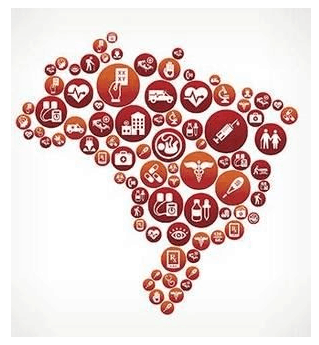UPSC Articles
Governance
Topic: General Studies 2:
- Issues relating to development and management of Social Sector/Services relating to Health
- Effect of policies and politics of developed and developing countries on India’s interest
Healthcare: The Brazilian Way

Daily Current Affairs IAS | UPSC Prelims and Mains Exam – 21st January 2020
Context:
The Brazilian President Jair Bolsonaro visits to New Delhi this Republic Day and one interesting field of cooperation to explore in the strategic partnership is healthcare.
Brazil, the only country where more than 100 million inhabitants have a universal health system- Unified Health System (Sistema Único de Saúde – SUS). Studying the system will have important lessons for Ayushman Bharat Scheme
About Brazils SUS
- SUS, underpinned by the principles of equity, solidary and social participation, aimed to develop a universal, comprehensive and decentralised health system, free of charge at the point of service provision
- The Unified Health System (SUS), which guaranteed free health coverage that included pharmaceutical services, was written into the new Constitution in 1988. It defined health as a Universal right and a State responsibility
- The SUS triggered a fundamental restructuring of how the health system is governed which included
- A process of decentralization and new arrangements for sharing of responsibilities across federal, state and municipal levels.
- A gradual increase of public spending on health
- National Health Identification Card: allows a patient’s health record to be accessed via a central database from any public or private hospital within the Unified Health System network.
- Family Health Programme: Community-based healthcare network who perform monthly visits to every family enrolled in the programme. They conduct health promotion and prevention activities and effectively manage the relationship between citizens and the healthcare system
Achievements of SUS
- Every year, the SUS covers more than two million births, 10 million hospital admissions, and nearly one billion ambulatory procedures.
- Life expectancy has increased from 64 years to almost 76 years.
- Infant Mortality Rate has declined from 53 to 14 per 1,000 live births.
- 95% of those that seek care in the SUS are able to receive treatment
- Fiscally Prudent achieved by better regulatory system. The cost of the universal health system in Brazil averages around $600 per person, while in the U.K., this number reaches $3.428. Brazil spends 3.8% of GDP on SUS, whereas UK which runs a similar program called NHS spends 7.9% of its GDP
- The Family Health Programme: Expanded from 4% of coverage in 2000 to up to 64% of the overall population in 2015 which has reduced IMR and increased adult labour supply
Challenges for SUS
- Economic and political crises, combined with austerity policies, pose a major risk to UHC. Thus the system has to remain resilient to such external shocks
- Internal shocks such rapid ageing leading to rise in disease burden. Public health spending in Brazil will thus need to increase by nearly 1.6 percentage points of the GDP by 2060 in order to cover the healthcare needs of a fast-ageing society.
Lesson for India from Healthcare system in Brazil
- Increase in Public health funding -Public health expenditure is still very low in India, at around 1.3% of GDP
- Family Health programme which involved regular visit to families ensures regular monitoring of health needs of people and thus strengthens the primary health care system
- Need for decentralization of the health care responsibilities by empowering municipalities with funds and powers
- National Health Identification Card scheme can be integrated by making use of Aadhar ecosystem so as to create a better system of coordination between public and private sector healthcare institutions regulated by the Health Agency
Way Ahead
- In a heterogeneous society like India where there is regional disparities, one-size-fits-all approach is not advisable
- Tamil Nadu, Sikkim, and Bihar differ in so many ways and this diversity must be met by an intricate combination of standardised programmes and autonomy to adopt policies according to their characteristics.
Connecting the dots
- Ayushman Bharat’s 1.5 Lakh wellness centres and Brazils Family Health Programme
- UK’s National Health Service
- Private Health care provision through Insurance Model Vs Public Health Service delivery through government hospitals











